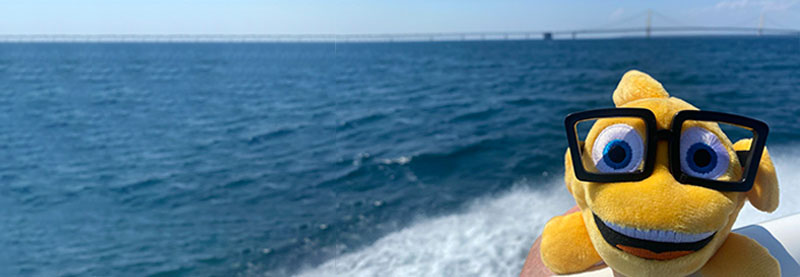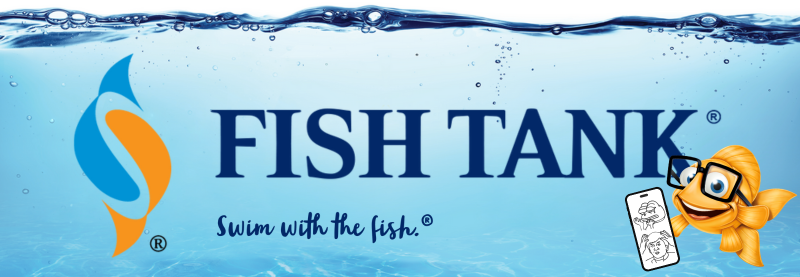Intellectual Property Insights from Fishman Stewart
Mini Article – Volume 23, Issue 10
Share on Social

World Ocean Day and Patents Powering the Tide of Change
By Kristyn Webb
June 8th is World Ocean Day which raises awareness about the importance of the oceans and encourages conservation efforts to protect marine ecosystems. Since this is a topic very near and dear to our beloved mascot Finny, we are taking a moment to highlight some of the game changing inventions designed to keep our oceans clean.
US8795519B2 describes a method and system for cleaning up oil spills, like what occurred in the 2010 Deepwater Horizon disaster. The invention seeds the spilled oil with tiny magnetic particles and then uses a boom to create a magnetic field to manipulate the oil spill for better cleanup.
The invention of US20230084588A1 is another play on magnetism for use in cleaning up oil spills. The disclosed magnetic nanoparticle coating turns a normal, everyday sponge into a “smart sponge”—an oil absorber that can suck up and store more than 30 times its weight in oil until wrung out or otherwise safely decontaminated and then reused.
Species of oil-eating bacteria occur in nature, and some are man-made. For example, in the 1970’s, Ananda M. Chakrabarty developed a new genetically engineered strain of the Pseudomonas bacteria, now known as Pseudomonas putida, that has the ability to break down hydrocarbons found in oil. He filed a patent with the US Patent Office but was initially rejected on the basis that a living organism could not be patented. He appealed the rejection, and it eventually landed in front of the US Supreme Court which ruled in his favor, establishing a precedent that genetically engineered living organisms could indeed be patented. This decision had far-reaching implications for the biotechnology industry, opening the doors to the patenting of genetically modified organisms and stimulating further advancements in the field.
In honor of World Ocean Day, we are offering for sale Finny NFTs. Any proceeds will go to support The Ocean Conservancy.
Kristyn Webb is the Group Leader of Fishman Stewart’s Copyright Practice Group, and is currently earning a Master’s Degree in Copyright Law at King’s College London.

Published June 2, 2023


Related Content from Fishman Stewart
One of his most famous songs, “Lose Yourself” was recently at the center of a lawsuit. In 2019, Eminem’s publishing company Eight Mile Style sued Spotify claiming that Spotify streamed a number of its musical compositions without proper licenses.
One of the most common challenges is whether AI should be free to train on data that is protected by copyright and owned by third parties without first obtaining permission.
The U.S. Copyright Office (USCO) recently published its latest report on AI and “copyrightability.” In short, the USCO considers only some AI-generated works to be sufficiently creative as to deserve copyright protection, and thus, registration.
Back in the 1940’s assignments by independent contractors could be permanent and irrevocable. Things changed in 1976, when Congress overhauled the Copyright Act.
Generally, copyright protects the specific expression of ideas, such as the arrangement and presentation of visual elements, but it does not protect general concepts or styles.
In the age of the internet, memes are a universal language. A meme is a piece of content, typically an image, video, text, or a combination of these, that spreads rapidly across the internet, often with humorous, relatable, or satirical undertones.
In the US, Thanksgiving is quickly approaching. For many, Thanksgiving and (American) football go hand-in-hand, with the Detroit Lions’ game as much a staple of the holiday as turkey and pie. However, this year’s game arrives amid controversy: Lions’ legendary Hall of Famer Barry Sanders is facing a lawsuit alleging copyright infringement.
After three years of litigation, a court has held that the “beat that goes on” for Cher’s right to continue receiving royalties on songs created during her marriage to Sonny Bono, despite attempts by Sonny’s widow, Mary Bono, to invoke federal copyright termination rights to end those payments.
Watching scary movies is a time-honored Halloween tradition, and one of the greatest movies to watch this time of year is “Ghostbusters” which premiered in 1984.
Halloween is coming up at the end of this month, and we are celebrating a little early with the spooky copyright story of Jap Herron!
IDENTIFYING, SECURING AND ADVANCING CREATIVITY®










